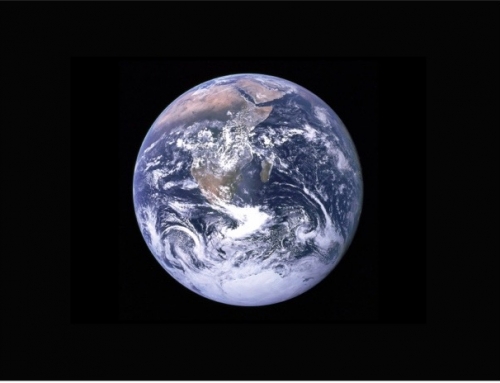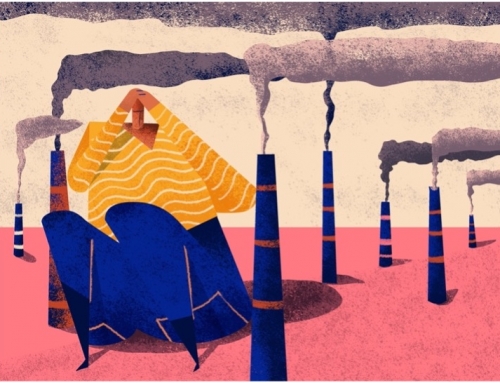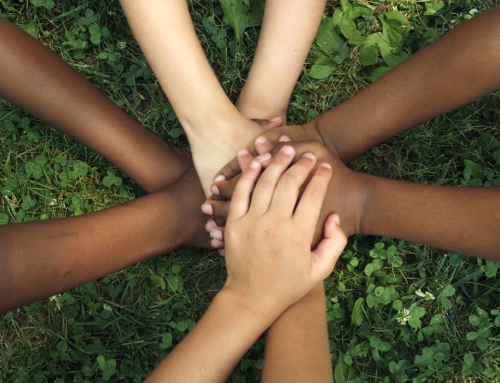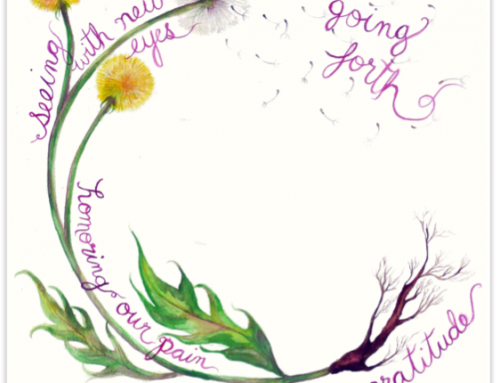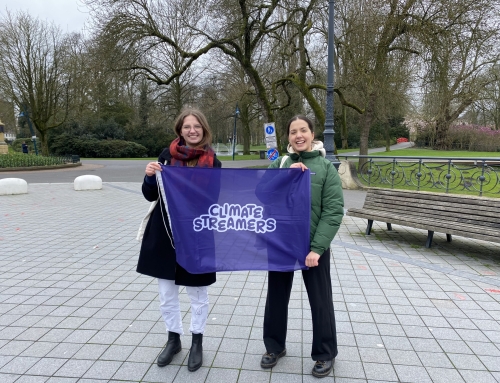Over the last few years, I have researched identity, brands, companies and organizations and especially how they can give back to the world. Reflecting on the course of action I took up until now, I noticed my scope was simultaneously broad and specific. When I was doing research on commercial companies and how they can give back to the world, I stumbled upon social enterprises. That was it, an epiphany, this was the solution and I worked that one solution out and preached its importance. However, what I failed to realize was that this was not the only solution. What caused this problem in the first place? I knew that something was wrong with our economy: our planet was deteriorating, our climate changes and the gap between rich and poor kept and still keeps, increasing and our economy is to blame for this. But how? What are we doing now that we should change in the future?
PERSPECTIVE
Until now, I looked at it from a mindset challenge perspective, the winner’s mentality: the mentality that lets you dig deep and do whatever it takes in terms of putting in effort, perseverance, taking action and inspiring others around you in order to overcome any adversity that may come your way and win in the end (Shikati, 2018), that is destroying our economy and consequently, our world. Greed encourages people to decide that their own share is too small (Hadas, 2012). Up until now, that was the perspective I took: the winner’s mentality is the problem and we can change that when we change from commercial companies to social enterprises.
DIG DEEPER
I decided to dive deeper into the problem: the effect our economy has on the world, and I came across other factors as well. In a way, it ís a mindset problem. Business models are still designed around maximizing shareholder value, the winner’s mentality. However, what I left out of scope, was what the HOW is of that business model. I left a crucial part of Sinek’s Golden Circle out of scope. The WHY of traditional business models is to maximize shareholder value, but HOW do these commercial companies realize this? By making a product or service, their WHAT. But HOW is this product or service made? I realized that this is of crucial importance because it turns out, this has an impact.
LINEAR ECONOMY
What I found is that this also a mindset problem, likewise the winner’s mentality but from another perspective. Humans need materials to produce the product they sell to customers. They take the materials they need, make the product, the product is used by the customer and then it is thrown away. This mentality, the take-make-waste mentality resulted in the linear economy that humanity created. Not only do we want to achieve – being the best – but also HOW we achieve this – take, make waste – is problematic. The take-make-waste mentality leaves a huge environmental footprint. Contradictory to the winner’s mentality’s impact, this impact is measurable. Phosphorus, an essential mineral for plants and humans on this planet will on estimation run out in 80 years (Cassella, 2017).
FROM LINEAR TO CIRCULAR
So, how do we solve this? Last year my focus lied on the solution for the competition mentality – trying to convince commercial companies to engage more in social enterprising since that was the solution I found in my research. Now, I want to broaden my scope and change perspective because there are more ways for companies to contribute to a better world. After the conversation I had with Krijn, he shared his thoughts and concerns on the government’s decision to have all Dutch companies use 50% less of the natural resources than they do now by 2030. This rule should lead towards a circular economy. I viewed the circular economy as something that does not specifically spark my interest. Until it was presented as a way to give back to the world as a business. I started looking into the circular economy and what it would mean for our world. What I found striking was that for the circular economy to develop and succeed in the first place, this would mean that we have to redesign society and our world. We should redesign our products, we should redesign our methods of production, we should redesign the way we think.
REDESIGN
System Reset, a documentary shot by the Disruptive Innovation Festival (2018), sheds light on what the circular economy could look like and how we should organize society. Right now, manufacturing is extremely centralized. The power to access resources lies in the hands of a few. The very that lie in a specific country, to gather the resources for a specific product for a specific company. Other countries or companies need to import the resources and rely on a specific area that has access to the resources (Diez, 2018). Let’s take the example of information. In the old days, media stations received information and broadcasted this as media content through newspapers, radio and television to the general public. You can compare this to the centralization of resources. In this case, the information was centralized. What happened however was, the internet arose. The internet enabled that everybody got access to information and could distribute it at any given time. The media no longer was the only party that had access to information. What if this happened to our resources? What if we were no longer dependent on central parties but had access to our own resources, all around us? What needs to happen for this is realized, is that we should be able to see the value of the resources around us. No longer waste, but resources. This requires looking locally, not globally. If we can manufacture locally, we can consume locally which is way more efficient than importing globally and producing so much waste.
CREATIVITY
Shifting from a take-make-waste mindset to a circular mindset requires change on all levels of society: from consumer to government. However, business can play a large part in this. If a business changes the way they design their products, they give consumers the chance to handle their products responsibly. What makes it difficult for businesses is however that they need to see connections that they have not seen ever before. This asks for a lot of creativity. I believe that Studio Lauda, as a creative agency, can anticipate on this upcoming creativity tremendously. Moving towards a circular economy needs a lot of co-creation and cooperation from business as a whole. We need to bridge between different sectors, it is very difficult to see connections that are not there right now. Luckily, these connections are already taking shape, for example, GroCycle a UK-based company, came up with the idea to grow mushrooms from coffee residue. The Dutch company Interface that makes carpet tiles from old fishing nets. They design these tiles so that they can be used again: circular. These connections between sectors need to be made all over the globe in order for the circular economy to flourish. This change gives way for a tremendous amount of creativity. I think that Studio Lauda, with its creativity, can contribute to this movement. I believe that we as human beings should use our creativity to heal the damage that we have done to our planet, if something, we owe it to our earth.
References:
Cassella, C. (2017, October 7). The World Could Soon Run Out of a Crucial Resource And Nobody Is Talking About It. Retrieved April 3, 2020, from https://www.sciencealert.com/the-world-could-soon-run-out-of-a-crucial-resource-and-very-little-is-being-done-about-it
Disruptive Innovation Festival – DIF. (2018, November 15). System Reset [Video file]. Retrieved from https://www.youtube.com/watch?v=_Wyo7u-1IBE&t=155s
Hadas, E. (2012, December 19). Ethical economy: Greed, justice and deception. Retrieved April 3, 2020, from https://www.breakingviews.com/columns/ethical-economy-greed-justice-and-deception/
Het Groene Brein. (n.d.). What are the disadvantages of the current linear economy? Retrieved April 3, 2020, from https://kenniskaarten.hetgroenebrein.nl/en/knowledge-map-circular-economy/ce-disadvantages-linear-economy/
Shikati, C. (2018, April 24). The winning Mentality: Do you have it? Retrieved April 3, 2020, from https://medium.com/the-ascent/the-winning-mentality-do-you-have-it-a5559eeadffd
REORGANIZING SOCIETY
System Reset, a documentary shot by the Disruptive Innovation Festival (2018), sheds light on what the circular economy could look like and how we should organize society. Right now, manufacturing is extremely centralized. The power to access resources lies in the hands of a few. The very that lie in a specific country, to gather the resources for a specific product for a specific company. Other countries or companies need to import the resources and rely on the specific area that has the access to the resources (Diez, 2018). Let’s take the example of information. In the old days, media stations received information and broadcasted this as media content through newspapers, radio and television to the general public. You can compare this to the centralization of resources. In this case, the information was centralized. What happened however was, the internet arose. The internet enabled that everybody got access to information and could distribute it at any given time. The media no longer was the only party that had access to information. What if this happened to our resources? What if we were no longer dependent on central parties but had access to our own resources, all round us? What needs to happen for this is realized, is that we should be able to see the value of the resources around us. No longer waste, but resources. This requires looking locally, not globally. If we can manufacture locally, we can consume locally which is way more efficient than importing globally and producing so much waste.
SETTING AN EXAMPLE
Shifting from a take-make-waste mindset to a circular mindset requires change on all levels of society: from consumer to government. However, business can play a large part in this. If business change the way they design their products, they give consumers the chance to handle their products responsibly. What makes it difficult for businesses is however that they need to see connections that they have not seen ever before. This asks for a lot of creativity. I believe that Studio Lauda, as a creative agency, can anticipate on this upcoming creativity tremendously. Moving towards a circular economy needs a lot of co-creation and cooperation from business as a whole. We need to bridge between different sectors, it is very difficult to see connections that are not there right now. However, I think that Studio Lauda, with its creativity can contribute to this movement.
These connections are already taking shape, for example, GroCycle a UK-based company, came up with the idea to grow mushrooms from coffee residue. The Dutch company Interface that makes carpet tiles from old fishing nets. They design these tiles so that they can be used again: circular. These connections between sectors need to be made all over the globe in order for the circular economy to blossom. This change gives way for a tremendous amount of creativity. I believe that we as human beings should use our creativity to heal the damage that we have done to our planet, if something, we owe it to our earth.
References
Cassella, C. (2017, October 7). The World Could Soon Run Out of a Crucial Resource And Nobody Is Talking About It. Retrieved April 3, 2020, from https://www.sciencealert.com/the-world-could-soon-run-out-of-a-crucial-resource-and-very-little-is-being-done-about-it
Disruptive Innovation Festival – DIF. (2018, November 15). System Reset [Video file]. Retrieved from https://www.youtube.com/watch?v=_Wyo7u-1IBE&t=155s
Hadas, E. (2012, December 19). Ethical economy: Greed, justice and deception. Retrieved April 3, 2020, from https://www.breakingviews.com/columns/ethical-economy-greed-justice-and-deception/
Het Groene Brein. (n.d.). What are the disadvantages of the current linear economy? Retrieved April 3, 2020, from https://kenniskaarten.hetgroenebrein.nl/en/knowledge-map-circular-economy/ce-disadvantages-linear-economy/
Shikati, C. (2018, April 24). The winning Mentality: Do you have it? Retrieved April 3, 2020, from https://medium.com/the-ascent/the-winning-mentality-do-you-have-it-a5559eeadffd

